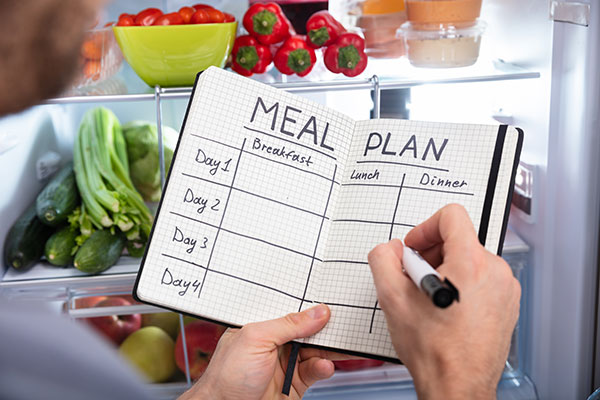Meal planning is a simple activity that involves planning your meals for a specified period of time. Instead of thinking of what to eat each day, you have a laid-out plan for different meals for each day of the week. While this may be considered a chore by some, meal planning is actually important and provides great benefits for the home. It can also help you consciously incorporate healthy foods and healthy eating habits into our diet which has become very essential as we stay at home.
Four top reasons why you should create a meal plan include:
- Saves Time
Creating a meal plan helps to eliminate last-minute trips to the market and time spent thinking about what meals to prepare each day. It will also give you a clear idea of all the food items you’ll need for the week, thus helping you shop accordingly.
2. Saves Money
Planning your meals in advance will help you save money in the long run. This is because you get to buy all your groceries in bulk thus reducing cost. A meal plan will also help reduce leftovers and food wastage because one food item can be used to cook a variety of meals for the week.

Stack of Coins and Red Clock on Balance 3D Illustration on White Background, Money Time Balance Concept
- Healthy Eating
Creating a meal plan is important because it helps you make healthier food choices. You get to plan your food intake for the whole week and pinpoint areas where you are not eating healthy. This will help you plan accordingly and help prevent last-minute junk food choices.
- Helps You Stay Organized
Meal planning improves your organization skills by helping you plan ahead and keeps track of your eating habits. It also helps you build discipline through following a strict grocery list and sticking to your healthy food choices.
To create a meal plan, you’ll need a pen, paper and some time to make your plan. Here are five essential steps you should follow when creating a meal plan:
- Pick Your Meal Planning Day
To create an effective meal plan, it’s important to set aside time regularly to determine the menu for the week. This should be done before your weekly grocery shopping so you can buy only the necessary items. What will the family eat for breakfast, lunch and dinner through the week? Write that down.
- Ask the Family’s Input.
A meal plan can only work if every member of the family sticks to it. To ensure that happens, consider who you’re planning these meals for, be sure to ask them what they’ll like to eat that week and incorporate one or two of the family’s favourite meals to the menu.
- Check Your Calendar
While planning, make sure to check your calendar for activities or events scheduled to take place during the week. This step is important because it will help you avoid preparing more food than necessary. You can also help you plan your weekly meals around these scheduled events.
- Take Stock.
When preparing your meal plan, an important step is to take inventory of the food items in your fridge and kitchen. Use the items you have already to plan one or two meals first before moving on to what you need to purchase. This will help you save money and reduce food wastage.
- Prep Your Meals
An easy way to save time after you’ve decided on a menu for the week is to prep your meals in advance. You can season, parboil and even cook meals in advance and store in your freezer for later consumption. This will help reduce your cooking time during the week and cut down food wastage because you’ve already planned these meals in advance.
Meal planning can become a very useful tool in your home if used effectively and can help improve a family’s healthy lifestyle.

